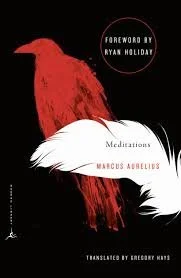Meditations
by Marcus Aurelius
“Not to feel exasperated, or defeated, or despondent because your days aren’t packed with wise or moral actions. But to get back up when you fail, to celebrate behaving like a human – however imperfectly – and fully embrace the pursuit that you embarked on.”
“It never ceases to amaze me: we all love ourselves more than other people but care more about their opinion than our own.”
I don’t know if it’s possible to have a ‘must-read’ list for gentlemen without including Meditations by Marcus Aurelius. If I had to make a list of top ten books, even top five books that everyone must read, this one easily makes the list. It should be read and re-read over one’s lifetime. I read Meditations cover to cover every couple of years and often refer to specific passages on an as-needed basis. Each time it speaks to me, with boulders of wisdom emerging off the pages as my situation in life changes. It is also my most annotated book. Quotes, sayings, and parcels of knowledge are underlined, highlighted, and circled alongside handwritten notes and observations. My copy of Meditations is a time capsule, capturing my thoughts and considerations at various points in life.
When reading Meditations, I must continually remind myself of two things. First, Marcus is writing to himself. The musings, insights, quips, and thoughts were never meant for the eyes of others, let alone readers 1,900 years in the future. Second, the struggles and anxieties he experienced in the 2nd Century are the same struggles and anxieties we go through in the 21st Century. Meditations is, in essence, about one man striving to become the best version of himself. That this book (or journal) still rings true centuries later is a testament not only to Marcus’ thinking but also the static nature of the human condition. It is at once timeless and relatable. It’s a comfort to know that Marcus, a Roman Emperor, experienced the same fears and frustrations as we face today.
Typically thought of as a Stoic philosophy book, I like to think of Meditations as one of history’s best and earliest self-help books. Throughout its pages we get the sense that Marcus is speaking to us (a modern-day audience) rather than his own intimate and private thoughts. This journal is his means of introspection and self-improvement. We see his continual frustration with himself as he fails to live up to his own ideals. He constantly reminds himself there are things outside his control – such as others’ thoughts and the nature of the universe – and to not focus on these things (as the all-powerful Emperor, this must have been a challenging proposition). He writes at length about confronting death. He is concerned about his failings and identifies where he falls short. He even laments in a very relatable way about getting up in the morning. These perceived failures, in fact, make Marcus more human. He is not showing off ‘life-hacks’ which led him toward peak efficiency. He does not brag about his greatness. He is hard on himself. This book is a great reminder to myself every time I fail to become the best I can be. But, like Marcus, if I keep trying and keep improving then perhaps I can inch closer to becoming that version of myself. After all, it is about the journey, because we will never reach the destination.
As I mentioned above, passages resonate differently depending on my stage in life. In my earlier years, I related with Marcus’ instructions when dealing with others, especially difficult people:
“Be tolerant of others and strict with yourself.”
“Nothing that goes on in anyone else’s mind can harm you.”
Now, as I creep past middle age, becoming more aware of my mortality, Marcus’ views on death as a part of the natural order seem relevant:
“Don’t look down on death, but welcome it. It too is one of the things required by nature. Like growth and maturity. Like a new set of teeth, a beard, the first graying hair…”
“Give yourself a gift: the present moment.”
The list of quotable passages is as long as the book itself. One gets the sense that Marcus would have been just as happy, if not happier, as a philosopher living out his days studying and writing. But the fact that even as an Emperor, at the absolute apex of Roman power, he still took the time to write about what bothered him and his personal struggles. He never stopped trying to be a virtuous person. Through reading Meditations, it seems as though Marcus largely avoided the corrupting influence of power, unlike many others before and after him. This alone is an ideal lacking among current political leaders.
What makes a great book? If one criterion is that readers want to read it multiple times, then Meditations falls into this category. If the mark of a great book is that it changes you or makes you think differently about your place in the world, then Meditations does that too. While I’m sure the translation matters (I like the Hays version), Meditations is approachable. It is not a long read and is not hard to read. There are no complex philosophical and metaphysical concepts to wrestle with. Deep? Yes. But I would argue that simplicity is what makes the deepest ideas deep. What makes this book so enduring is the ability to distill what we are all thinking about in our minds into clear and actionable reminders that we are all flawed but can still aspire to improve.
